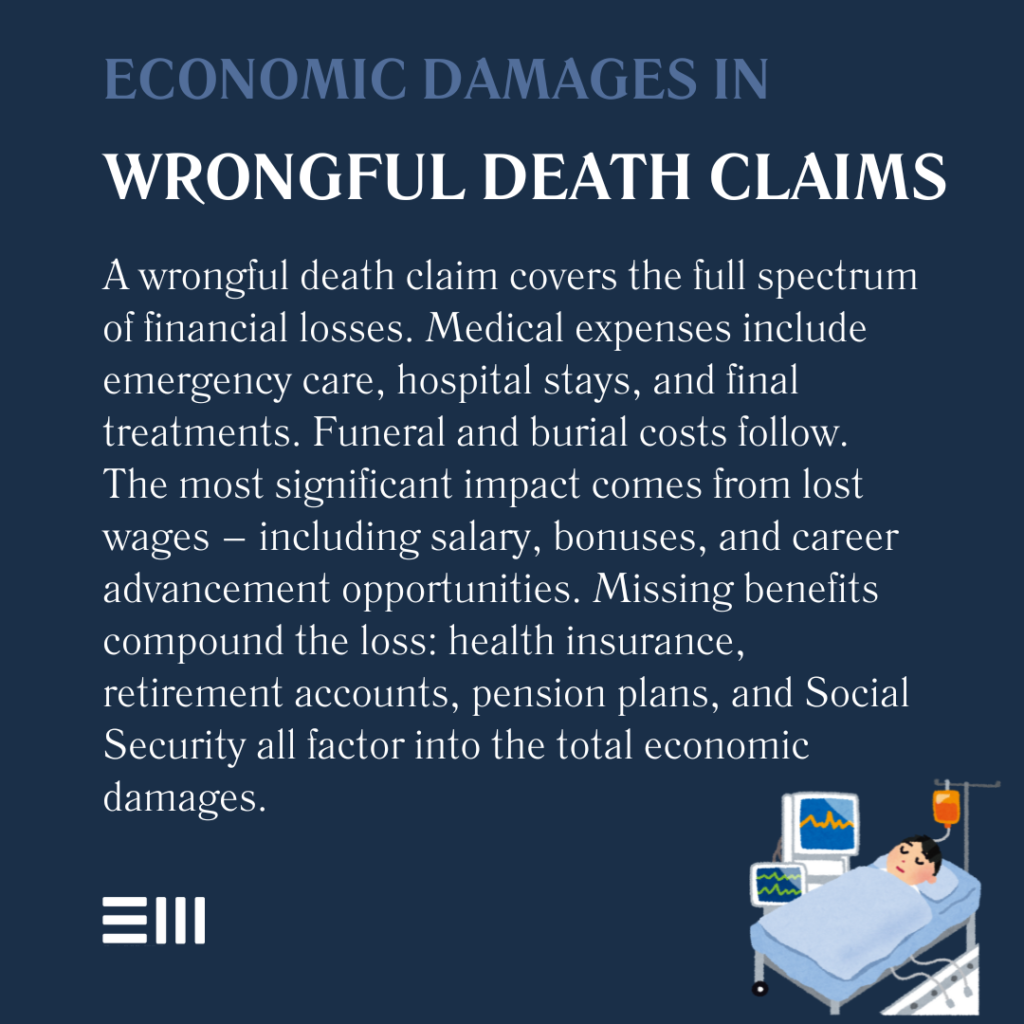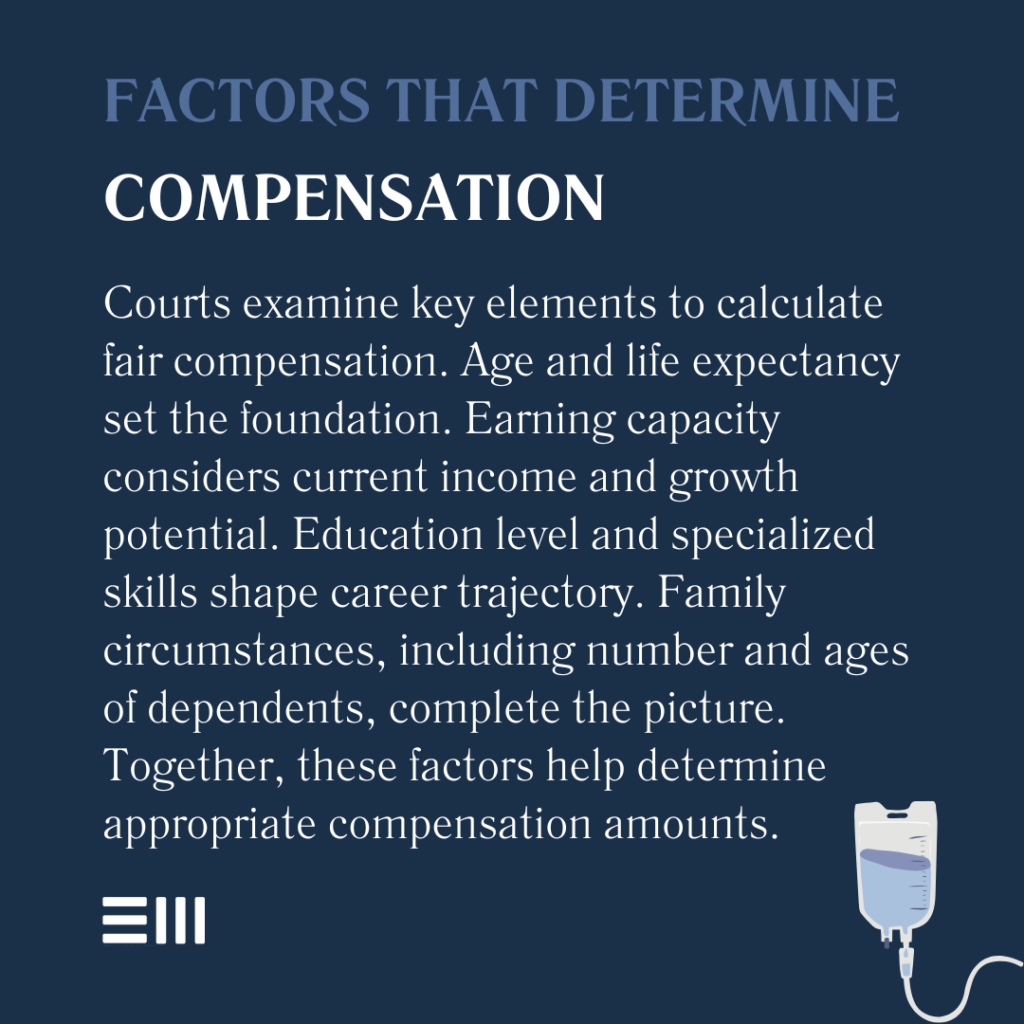
Every seven minutes in the United States, a preventable death occurs due to medical errors alone, accounting for over 250,000 deaths annually.
Behind each statistic lies a devastated family grappling with both emotional trauma and financial uncertainty.
Understanding the types of damages available in wrongful death lawsuits helps families seek the justice and compensation they deserve during these challenging times.
Available Damages in Wrongful Death Cases
Alabama law recognizes several distinct categories of damages in wrongful death cases, each designed to address different aspects of loss experienced by surviving family members.
Understanding these categories helps families comprehend the full scope of potential compensation available to them.
Economic Damages
Economic damages represent the concrete financial losses that can be calculated and documented following the death of a loved one. These damages form the foundation of most wrongful death claims and typically include several key categories.
The following expenses are commonly included in economic damage calculations:
Medical Expenses Prior to Death
- Emergency room and hospital costs;
- Surgical procedures;
- Medications and treatments;
- Rehabilitation services;
- Medical equipment; and
- Nursing care.
Funeral and Burial Costs
- Funeral service expenses;
- Cemetery plot and headstone;
- Burial or cremation fees;
- Memorial services; and
- Transportation costs.
Lost Wages and Future Earnings
- Current salary and benefits;
- Projected career advancement;
- Annual raises and bonuses;
- Overtime opportunities;
- Business opportunities; and
- Professional development potential.
Loss of Benefits
- Health insurance coverage;
- Retirement accounts;
- Pension plans;
- Stock options;
- Educational benefits; and
- Social Security benefits.
These economic damages provide the foundation for establishing the financial impact of the loss, though they represent only one aspect of the total compensation available to families.
Non-Economic Damages
While harder to quantify than economic losses, non-economic damages acknowledge the profound personal impact of losing a family member. These damages address the emotional and psychological consequences that affect daily life and future well-being.
Consider the following categories of non-economic damages that courts may award:
- Physical pain endured before death;
- Emotional distress;
- Anxiety and depression;
- Loss of enjoyment of life; and
- Psychological trauma.
Mental Anguish of Family Members
- Emotional distress;
- Grief counseling expenses;
- Depression and anxiety treatment;
- Sleep disorders; and
- Post-traumatic stress.
Loss of Companionship
- Spousal relationship;
- Parent-child bond;
- Sibling relationships;
- Extended family connections; and
- Social support system.
Loss of Parental Guidance
- Educational support;
- Moral instruction;
- Career guidance;
- Life skills teaching;
- Emotional development; and
- Character formation.
Each of these categories represents a significant aspect of loss that deserves recognition and compensation within the legal system.
Punitive Damages
In cases involving particularly egregious conduct, Alabama courts may award punitive damages to both punish wrongdoers and deter similar behavior in the future. These damages serve a broader societal purpose beyond compensating the family.
Several key factors influence punitive damage awards:
- Degree of negligence;
- Intent behind actions;
- Prior similar incidents;
- Financial resources of defendant;
- Potential impact on future conduct; and
- Public safety implications.
The determination of punitive damages requires careful consideration of both the defendant’s conduct and the potential deterrent effect on similar future behavior.

Calculating Wrongful Death Compensation
The process of calculating wrongful death compensation involves complex analysis and consideration of numerous factors. Understanding these elements helps families and their legal representatives build stronger cases for fair compensation.
Primary Evaluation Factors
Accurate damage calculations require thorough examination of multiple aspects of the deceased’s life and potential. The following factors play crucial roles in determining compensation:
Age and Life Expectancy
- Statistical life expectancy;
- Family health history;
- Lifestyle factors;
- Occupation risks; and
- Geographic considerations.
Earning Capacity
- Current income level;
- Industry growth potential;
- Economic trends;
- Market conditions;
- Career advancement opportunities; and
- Specialized skills.
Education and Training
- Degree level;
- Professional certifications;
- Continuing education;
- Technical skills;
- Industry experience; and
- Leadership potential.
These factors combine to create a comprehensive picture of the deceased’s potential contributions and the family’s corresponding losses.
Expert Testimony
Professional analysis strengthens damage calculations through specialized knowledge and experience.
Expert witnesses provide critical support in several key areas:
- Economic projections;
- Industry forecasts;
- Actuarial tables;
- Medical assessments;
- Vocational evaluations; and
- Financial planning expertise.
Expert testimony helps translate complex data into clear evidence that supports the family’s claim for fair compensation.

Time Limits and Legal Requirements
Success in wrongful death cases often depends on meeting specific deadlines and following proper procedures. Understanding and adhering to these requirements ensures the protection of legal rights and opportunities for compensation.
Critical Deadlines
Alabama law establishes several important time limits that affect wrongful death claims.
Families should be aware of the following deadlines:
- Two-year statute of limitations from date of death;
- Notice requirements for government entities;
- Probate court filing deadlines;
- Insurance claim notification periods; and
- Evidence preservation timeframes.
Meeting these deadlines requires prompt action and careful attention to legal requirements throughout the process.
Taking the Next Step: Legal Support When You Need It Most
The path to justice in wrongful death cases requires experienced legal guidance and support. Our team provides comprehensive assistance through every stage of the process, ensuring protection of your rights and interests.
Contact us today for a confidential consultation to discuss your case and explore your options for seeking justice. Your family’s future matters, and we’re here to help you protect it.
Can't find what you're looking for? Search our site below.










